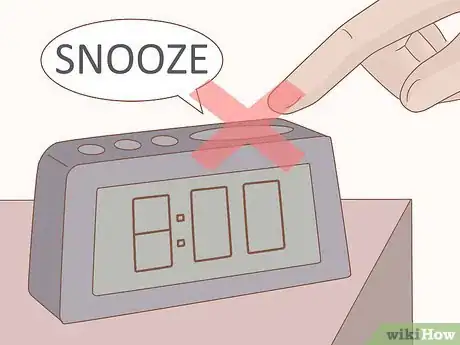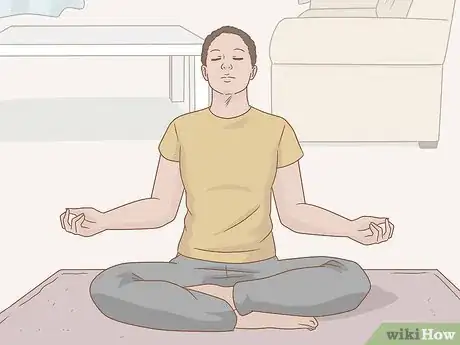This article was co-authored by Sari Eitches, MBE, MD. Dr. Sari Eitches is an Integrative Internist who runs Tower Integrative Health and Wellness, based in Los Angeles, California. She specializes in plant-based nutrition, weight management, women's health, preventative medicine, and depression. She is a Diplomate of the American Board of Internal Medicine and the American Board of Integrative and Holistic Medicine. She received a BS from the University of California, Berkeley, an MD from SUNY Upstate Medical University, and an MBE from the University of Pennsylvania. She completed her residency at Lenox Hill Hospital in New York, NY and served as an attending internist at the University of Pennsylvania.
There are 12 references cited in this article, which can be found at the bottom of the page.
This article has been viewed 63,692 times.
Do you find yourself often waking up in a bad mood? Many people report waking up in a bad mood either due to poor sleep or other reasons. However, by establishing good sleeping habits and improving your outlook on life, you can wake up feeling refreshed, happy, and ready to take on the day!
Steps
Unwinding Before Bedtime
-
1Do not eat before you sleep. Try to have your last meal or snack at least two hours before bedtime.[1] Though it may be tempting to snack late at night, doing so will disrupt your sleep as your body will be attempting to digest what you’ve consumed.[2]
- If you are extremely hungry or don’t want to give up your late night grazing all together, choose light, healthy foods. For example, eating fresh fruit will satisfy you without taking too much energy to digest.
-
2Drink something warm. A hot drink can do wonders in relaxing your body and mind and preparing for a good night’s sleep. Try drinking warm milk or a cup of herbal tea.
- Avoid alcohol and caffeine, both of which will disrupt your sleep cycle and also likely make you groggy in the morning.
- Certain herbal teas, such as chamomile might help you to relax, so if you struggle to unwind at night, try incorporating some of these into your nighttime ritual.
Advertisement -
3Relax in the evening. Don’t do anything stressful (such as homework or work-related things) at least an hour or so before bedtime. Stress leads to impaired sleep.[3]
- If possible, get all of your chores done during the day. If you head to bed in a calm, relaxed state, you’re more likely to sleep better and wake up in the same calm mood. Being plagued by tasks you need to do or recurring problems is going to make it more difficult to wake up in a good mood.
- Reading, crafts (such as drawing or knitting), or just chatting with your friends or family are all great ways to unwind in the evening. Watching TV or a movie can also be a good idea as long as it’s done relatively early in the evening.
-
4Prepare for your day the night before. Try to cut down on the chores that may stress you out by doing them ahead of time. That way you won’t go to sleep and wake up dreading the tasks ahead of you as you’ll have already gotten them out of the way.[4]
- For example, get in the habit of picking out your work clothes and setting them out the night before.
- If you usually throw a lunch together before heading to the office or school, try to prepare it the night before so you can just grab it on your way out. Such practices will allow you to clear parts of your morning for mood-boosting activities.
-
5End the day before with a clear head. How you end your day can often influence how you feel the next morning so do your best to clear your head of negative or stressful thoughts and go to sleep in a relaxed manner.[5]
- If you find yourself going through all of the things you have to do the next day or dwelling on stressful events, try setting some positive intentions (such as “I will do something kind for someone tomorrow for no reason”) or make a mental list of what you are grateful for in life.
-
6Get enough sleep. Too many people are chronically sleep deprived and then wonder why they’re grumpy upon waking up. Adults should get about seven to nine hours of sleep every night so do your best to get enough shut-eye.[6]
-
7Get quality sleep. You want to get a deep, good night’s rest so avoid screens such as your phone, computer, and television for an hour or two before heading to bed.[7] The light that comes from these screens actually fools our bodies into thinking that it is still daylight, which can disrupt the natural winding down process and makes it difficult to get a deep sleep.[8]
Establishing Good Morning Habits
-
1Wake up earlier. If you typically sleep in late whenever you can, try getting in the habit of waking up earlier. There are general strategies to help you wake up more smoothly. Research suggests that waking up earlier is better for your mental health as those who wake up late in the day have higher incidences of various psychological conditions.
- Try waking up between 6-8:30 am, which is when the body is most responsive to sunlight.
- If it is impossible or unrealistic to wake up at this time, do your best to wake up at the same time every day. Waking up at the same time every day trains your body to be more alert upon waking up, which will help you feel refreshed and happier.
- Try waking up between 6-8:30 am, which is when the body is most responsive to sunlight.
-
2Don’t hit the snooze button. As tempting as it is to get just a few more minutes of sleep in, studies have shown that hitting snooze on your alarm can actually be extremely detrimental to your overall mood. Hitting snooze and going in and out of sleep confuses the body and makes it more difficult over time to wake up properly.[9]
-
3Wake up in a well lit area. Just as it’s important to turn off the screens and rest in a darkened room, it’s important to wake up to light. Our internal body clocks are influenced by these factors so when we are exposed to light, our bodies begin to naturally wake up.[10]
- Keep the shades open in your room so that as the sun rises, your body will respond to the natural light.
- If your room doesn’t have windows or much sunlight access, consider investing in a lamp that turns on at a set time.
- Once you begin waking up in a well lit room at the same time every day, you may find that your body eventually develops that pattern and you’ll be able to skip the annoying alarm clock altogether.
-
4Stretch. Upon waking up, try doing some stretches. You don’t even have to get out of bed for this, just stretch and flex your limbs in whatever ways feel good to you. Doing so will get the blood flowing throughout your body and also release endorphins.
- If you have time, you can even practice do some short yoga sequences each morning as that will certainly lift your spirits and help you feel physically and psychologically better.
-
5Play some uplifting music while preparing for your day. Music has the ability to powerfully influence the mood of the listener, so try incorporating it into your morning routine. Choose music that is cheery, upbeat, and easy on the ears for maximum mood boosting impact. An example of an uplifting song is "Happy" by Pharrell Williams!
-
6Eat breakfast. We all know it but too many of us forget that breakfast is the most important meal of the day and helps keep you fueled and happy throughout.
- Choose healthy, unprocessed foods that are easy to digest and give you lots of energy.[11] Fresh fruit, protein (such as eggs or peanut butter), and whole grains (such as whole wheat toast or oatmeal) are all great options.
- If you don’t have time to prepare breakfast every morning, just grab some fruit and nuts on your way out. These foods require no preparation yet have all the fuel and nutrients you need to start your day right.
Improving Your Outlook
-
1Practice positivity. Studies have shown that positive thinking helps with stress management which comes with many health benefits, including generally being in a better mood.[12] If you tend to focus on the negative in life, work to create a more positive outlook and you will be a happier person.
- One helpful practice can be to make regular lists of good things that happen to you or things that you are grateful for. After a while, you will start to notice these aspects of life more and eventually thinking positively will become second nature to you.
-
2Meditate.[13] Regardless of when or how long you meditate for, regular meditation can help a great deal in improving your mood. Many people are intimidated by meditation, but carving out just five to ten minutes each day to sit and focus on your breath can have a powerful impact on your mood, not only helping you sleep better but also improving your everyday mood.[14]
-
3Deal with problems. Many people sleep poorly or wake up in a bad mood because there’s an underlying problem that they haven’t addressed. Resolving these issues in your life, whether they are work or family problems, will help you sleep better and wake up looking forward to the day, rather than dreading it. Resolving problems also helps reduce anxiety.
-
4Start the day with a smile. Studies have shown that, regardless of how you feel, just the physical act of smiling releases dopamine and serotonin in the brain which makes you happier.[15] So try even faking a smile until you do feel better.
-
5Exercise. There are many benefits to exercise, including improved physical health and steady release of endorphins, but a study has also shown that people who exercise have better sleep quality, fall asleep more easily, and report being less tired during the day.[16]
- You don’t have to exercise a great deal to see these benefits. In one study, participants exercised at least two and a half hours a week to get the benefits of better sleep.
- There are many kinds of exercise that you can do to achieve this. Sports, dance, even brisk walking are all great options so find a physical activity that you genuinely enjoy doing and see how it influences your sleep and your mood upon waking up.
-
6Keep flowers in the house. Research has shown that keeping flowers in one’s house can decrease anxiety and depression and improve one’s mood.[17]
- They don’t have to be fancy bouquets. Even just picking a bunch of wildflowers or a few daffodils from your garden can brighten up your living space and your mood.
Expert Q&A
-
QuestionWhat can I do the night before to wake up happy the next day?
 Sari Eitches, MBE, MDDr. Sari Eitches is an Integrative Internist who runs Tower Integrative Health and Wellness, based in Los Angeles, California. She specializes in plant-based nutrition, weight management, women's health, preventative medicine, and depression. She is a Diplomate of the American Board of Internal Medicine and the American Board of Integrative and Holistic Medicine. She received a BS from the University of California, Berkeley, an MD from SUNY Upstate Medical University, and an MBE from the University of Pennsylvania. She completed her residency at Lenox Hill Hospital in New York, NY and served as an attending internist at the University of Pennsylvania.
Sari Eitches, MBE, MDDr. Sari Eitches is an Integrative Internist who runs Tower Integrative Health and Wellness, based in Los Angeles, California. She specializes in plant-based nutrition, weight management, women's health, preventative medicine, and depression. She is a Diplomate of the American Board of Internal Medicine and the American Board of Integrative and Holistic Medicine. She received a BS from the University of California, Berkeley, an MD from SUNY Upstate Medical University, and an MBE from the University of Pennsylvania. She completed her residency at Lenox Hill Hospital in New York, NY and served as an attending internist at the University of Pennsylvania.
Integrative Internist Try to make the night before as calming and relaxing as possible. Keep your lights dim in the evening and turn off all lights once you do fall asleep. You should also avoid using electronics or looking at screens for about 30 minutes before you fall asleep.
Try to make the night before as calming and relaxing as possible. Keep your lights dim in the evening and turn off all lights once you do fall asleep. You should also avoid using electronics or looking at screens for about 30 minutes before you fall asleep. -
QuestionWhat diet is best for sleep?
 Sari Eitches, MBE, MDDr. Sari Eitches is an Integrative Internist who runs Tower Integrative Health and Wellness, based in Los Angeles, California. She specializes in plant-based nutrition, weight management, women's health, preventative medicine, and depression. She is a Diplomate of the American Board of Internal Medicine and the American Board of Integrative and Holistic Medicine. She received a BS from the University of California, Berkeley, an MD from SUNY Upstate Medical University, and an MBE from the University of Pennsylvania. She completed her residency at Lenox Hill Hospital in New York, NY and served as an attending internist at the University of Pennsylvania.
Sari Eitches, MBE, MDDr. Sari Eitches is an Integrative Internist who runs Tower Integrative Health and Wellness, based in Los Angeles, California. She specializes in plant-based nutrition, weight management, women's health, preventative medicine, and depression. She is a Diplomate of the American Board of Internal Medicine and the American Board of Integrative and Holistic Medicine. She received a BS from the University of California, Berkeley, an MD from SUNY Upstate Medical University, and an MBE from the University of Pennsylvania. She completed her residency at Lenox Hill Hospital in New York, NY and served as an attending internist at the University of Pennsylvania.
Integrative Internist Base your diet on whole, unprocessed foods to help you sleep better. Additionally, don't snack before bed. Stop eating at least 2 hours before you plan to go to bed.
Base your diet on whole, unprocessed foods to help you sleep better. Additionally, don't snack before bed. Stop eating at least 2 hours before you plan to go to bed.
References
- ↑ Sari Eitches, MBE, MD. Integrative Internist. Expert Interview. 3 April 2020.
- ↑ https://www.mayoclinic.org/healthy-lifestyle/adult-health/in-depth/sleep/art-20048379
- ↑ https://www.mdanderson.org/publications/focused-on-health/healthy-sleep-habits.h13-1589046.html
- ↑ https://www.mayoclinic.org/healthy-lifestyle/adult-health/in-depth/sleep/art-20048379
- ↑ https://www.webmd.com/sleep-disorders/your-sleep-checklist
- ↑ https://sleepeducation.org/healthy-sleep/healthy-sleep-habits/
- ↑ Sari Eitches, MBE, MD. Integrative Internist. Expert Interview. 3 April 2020.
- ↑ https://health.clevelandclinic.org/put-the-phone-away-3-reasons-why-looking-at-it-before-bed-is-a-bad-habit/
- ↑ http://www.huffingtonpost.com/2014/08/01/why-hitting-snooze-is-bad-for-health_n_5630707.html
- ↑ https://www.webmd.com/sleep-disorders/ss/slideshow-wakeup-tips
- ↑ Sari Eitches, MBE, MD. Integrative Internist. Expert Interview. 3 April 2020.
- ↑ http://www.mayoclinic.org/healthy-lifestyle/stress-management/in-depth/positive-thinking/art-20043950
- ↑ Sari Eitches, MBE, MD. Integrative Internist. Expert Interview. 3 April 2020.
- ↑ http://www.health.harvard.edu/staying-healthy/what-meditation-can-do-for-your-mind-mood-and-health-
- ↑ https://www.webmd.com/mental-health/news/20190411/science-says-smiling-helps-you-get-happy
- ↑ https://sleepeducation.org/healthy-sleep/healthy-sleep-habits/
- ↑ https://ellisonchair.tamu.edu/health-and-well-being-benefits-of-plants/














































































Medical Disclaimer
The content of this article is not intended to be a substitute for professional medical advice, examination, diagnosis, or treatment. You should always contact your doctor or other qualified healthcare professional before starting, changing, or stopping any kind of health treatment.
Read More...